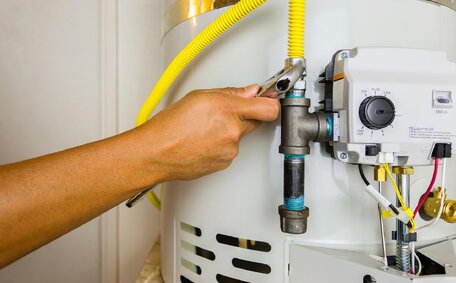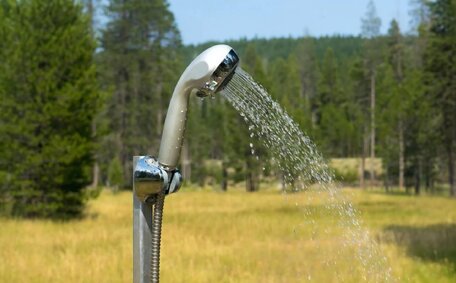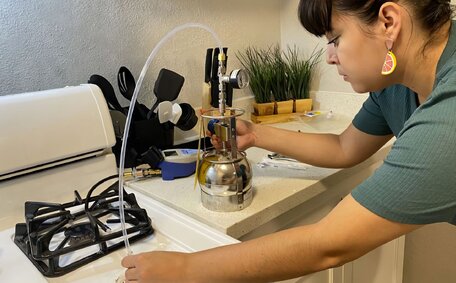Introduction to Chemical Drain Cleaners
Yet common drain cleaning solutions often contain potent, highly corrosive substances such as sulfuric acid, sodium hydroxide, and hydrochloric acid.
When dealing with slow drains, the allure of chemical drain cleaners promising swift blockage resolution is tempting. These harsh chemicals, including muriatic acid, are designed to break down organic material in the drain, yet can damage your pipes, put your health at risk, and harm the environment.
Health and Safety Risks
It is essential to recognise the health and safety hazards associated with chemical cleaning products, including drain cleaners, when addressing clogged drains.
Substances like sulfuric acid, sodium hydroxide, and hydrochloric acid in drain cleaners can cause severe burns to skin and eyes on contact.
It’s wise to wear safety gear when dealing with chemical drain cleaners for your pipes and to engage a professional plumber for any complex drain issues.
Risk of Damage to Plumbing
Frequent use of abrasive cleaners can seriously damage plumbing infrastructure, leading to the need for professional repair services to address the resulting damage. Highly corrosive ingredients in these products, like sulfuric acid, can clog your PVC pipes’ future with damage to the material upon continuous exposure. The intense heat from chemical reactions caused by drain cleaners can end up diminishing your pipe integrity, leading to a gradual erosion of pipe walls.
This gradual deterioration can ultimately cause disastrous leaks, ruptures, and blockages as pipes weaken, becoming vulnerable to invasive elements like tree roots and grease. Certain scenarios reveal drain cleaners can exacerbate situations like hair clogs caused by grease food particles, creating reactions that further compact the material, worsening the initial blockage.
Using more cleaner to tackle such congealed blockages can often make the clog worse than initially thought.
Home improvement nightmares may arise, like having to tear up bathroom or kitchen walls to access pipes, significantly elevating the cost of unforeseen plumbing repairs. And the health risks to plumbers working with corroded pipes exposed to years of harsh chemicals also bears noting.
Homeowners should evaluate their plumbing systems to check if pipes are made of durable materials, such as cast iron, to avert issues arising from the use of chemical cleaners. But also remember, no septic system, including your septic tank, regardless of material, remains unaffected after years of exposure to corrosive products. Consider safer alternatives that can used for natural drain cleaning instead, whenever possible.
Environmental Impact
Chemical-based drain cleaners, once they seep into natural environments, cause significant negative impacts. Toxic components such as sulfuric acid and sodium hydroxide can navigate their way into your drain and into local waterways, untreated. Even minute quantities of these substances can wreak havoc on aquatic life, a dire consequence of casual use down drain.
Aquatic life, including fish and plants, are at risk from the acidic, alkaline, and biologically disruptive properties of substances in drain cleaners. Altering pH levels in streams can create hazards for entire ecosystems, particularly when using drain chemicals indiscriminately. They essentially invoke poison control concerns by poisoning aquatic environments in the quest to clear household blockages.
Enzymatic solutions introduce a safe alternative; they break down waste in harmony with natural processes and without adverse environmental effects. Manual drain clearing methods such as plungers effectively address blockages without the chemical contamination risks associated with commercial cleaners. It’s imperative to prevent toxic chemicals from contaminating ecosystems to mitigate the environmental harm caused by drain cleaners.
Before resorting to chemical drain cleaners, consider safer, mechanical methods that professionals recommend. The short-term convenience simply isn’t worth lasting ecological impacts that could ripple back to the water source in your home.
Alternatives to Chemical Drain Cleaners
Fortunately, there are more environmentally considerate and gentler cleaners available as alternatives to harsh chemical drain cleaners.
Natural Drain Cleaning Methods
Baking Soda and Vinegar
A combination of hot water, baking soda, and vinegar can effectively tackle common drain issues like soap scum, serving as a natural alternative. To boost the cleaning effect, follow the baking soda and vinegar reaction with a flush of boiling water down the drain.
Pour 1⁄2 cup of baking soda followed by 1 cup of warm vinegar down the drain for an easy, natural cleaning solution.
Mechanical Drain Cleaning
Manual tools such as drain snakes provide a chemical-free method to remove blockages from drains. Standard household items like plungers use suction to dislodge clogs, while drain snakes physically grab and pull out debris. Both methods can handle sink, tub, and floor drain blockages, among much more.
For more challenging blockages, discuss professional-grade electric drain machines and pressurised water jetting with your plumber. These industrial tools are how professional drain cleaners work, extremely effective at clearing out even severe clogs and hard buildup via mechanical force.
Hiring a Professional Plumber
Though natural cleaners often serve well, Experienced plumbers can tackle severe blockages using specialized drain cleaners and their skilled maintenance techniques. They have commercial enzymatic products that safely eat away organic debris, advanced augers that reach deep blockages, and high-powered hydro jetting for the most extreme clog removal.
Opt for safer alternatives to toxic chemical cleaners and, if needed, enlist professional assistance. Call a professional plumber for fast, effective and environmentally responsible drain clearing services instead.
When to Call a Professional Plumber
While natural cleaners and DIY methods have their place for minor clogs, there are certain scenarios that call for contacting a professional plumber instead of attempting drain repairs yourself.
Signs To Call A Plumber
- Recurring clogs that can just keep reappearing despite attempts at clearing them
- Completely blocked drains where water can no longer flow
- Noticeable drain backups that are slow to clear even with chemical cleaners
- Gurgling sounds coming from pipes when water drains
- Significant linked plumbing issues like leaks or burst pipes
- If you’ve already attempted to auger or snake the drain without success
Complete blockages, recurring clogs, overflows and slow drainage suggest severe underlying issues, often requiring professional intervention instead of toxic chemicals. Attempting to rectify these yourself with toxic chemicals simply causes further damage.
Why Blakehurst Plumbing Should Be Your First Call
Blakehurst Plumbing are your local drain specialists ready to tackle any stubborn clog or plumbing issue. Our team brings decades of combined experience across residential and commercial properties. We stay up to date on the latest industry best practises and eco-friendly methods for superior drain clearing and plumbing maintenance.
Our equipment, ranging from high-powered electric augers to advanced hydro jetting with pressurised water, is ideal for any task. And our extensive knowledge of local plumbing systems allows us to find solutions where DIY attempts have failed.
Contact Blakehurst Plumbing at 1300 349 338 or email [email protected] for prompt, cost-effective, and dependable drain cleaning services. Get in touch and prevent hazardous chemical cleaner risks today.
Conclusion: Think Twice Before Using Chemical Drain Cleaners
Although chemical drain cleaners offer a rapid solution, the associated risks to health, plumbing, and the environment frequently eclipse their benefits. Learn more about the harsh chemicals in these products as they can seriously endanger yourself and others in your household through skin contact, inhalation or ingestion accidents.
These cleaners can lead to damaged pipes over time, contradicting their promotional guarantees and causing issues in your home. And pouring corrosives down the drain contributes to toxic contamination of waterways.
Mechanical drain clearing strategies, like the plunger, snake, or baking soda concoctions, skirt chemical risks and remain notably effective for the usual clogs in your sink.
But for more extreme blockages, where the drain can become a recurring or overflowing problem, skip the DIY attempts and call in a professional plumber.
By weighing up these chemical drain cleaner disadvantages against the safer mechanised alternatives, the choice becomes clear. Guard your wellbeing, maintain your plumbing, and avoid ecological damage by thinking twice before reaching for that bottle of drain cleaner.
If you have any concerns about a blocked drain, contact our team at Blakehurst Plumbing on 1300 349 338 for professional assistance with all your needs.






